|
October 25, 2011 - No. 11
Discussion on Election Results
Low Voter Participation in
40th Ontario General
Election
Discussion on Election Results
• Low Voter Participation in 40th Ontario
General Election - Tim Sullivan
• The Need to Take Up Discussion to Solve the
Problems We Face - Jim Nugent
• No Harper Hat-Trick in Greater Toronto Area
- Steve Rutchinski
In Defence of Public Services
• Beware the Commission on the Reform of
Ontario's Public Services
Toronto
• Defeat the Ford Administration's Agenda:
Defend the City Workers! - David
Greig
• Housing Is a Right! Oppose
Decision to Sell-Off Social Housing!
• Vigorous Opposition to Anti-Social Wrecking
at City Council
Discussion on Election Results
Low Voter Participation in
40th Ontario General
Election
- Tim Sullivan -
The record low turnout in the Ontario election is cause
for real concern. It can be readily deduced that it reflects the
growing rejection by the electorate of all the major parties and
their system of governance. That the level of participation has fallen
below 50 per cent in a provincial election, at a time when such
major problems are afflicting the peoples of Canada and the rest of the
world, is truly astonishing. It is certainly not enough that the
electorate sees through the sham that the ruling circles try to impose
on it. The situation requires that the people activate themselves and
find the ways and means to overcome
the constraints that keep them out of the process and out of power.
But what is even more astonishing is the reaction of the
party leaders themselves, in the face of this utter debacle. Dalton
McGuinty had the nerve to say that he had received a "major minority,"
while Tim Hudak is crowing about how he has McGuinty "on a short
leash." These claims are preposterous in the
face of the reality that most voters didn't vote and the overwhelming
majority of the electorate didn't vote for either of them. An honest
person who was the least bit concerned with representing the
people and trying to gauge the opinions and desires of the electorate
would be sounding the alarm bells
and doing their utmost to address the problem of "non-participation."
But they seem oblivious to the predicament and are content to rule with
a
small percentage of the votes. They don't grasp the fact that they held
an elaborate
popularity contest and nobody won.

The Need to Take Up Discussion to
Solve the Problems
We Face
- Jim Nugent -
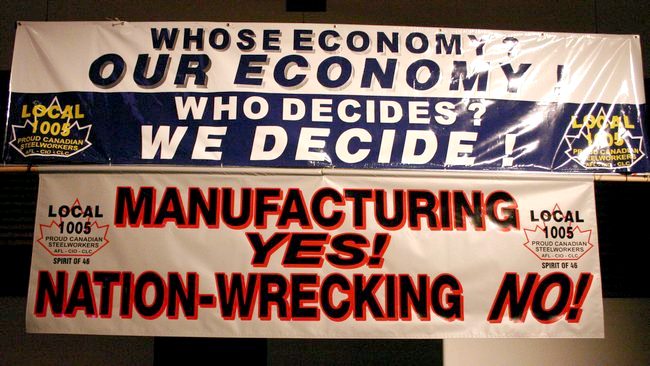 The election for the
Ontario legislature has come and
gone without Ontario workers' real working and living conditions,
demands and concerns ever being addressed in a serious way by either
the ruling party in power once again or those which form the Official
Opposition. The monopoly media also maintained silence
about these real election issues. The election for the
Ontario legislature has come and
gone without Ontario workers' real working and living conditions,
demands and concerns ever being addressed in a serious way by either
the ruling party in power once again or those which form the Official
Opposition. The monopoly media also maintained silence
about these real election issues.
Decades of wrecking of the manufacturing and resources
industries by the big monopolies and recurring crises triggered by
financial swindling have left hundreds of thousands of workers
struggling to find a livelihood and are driving down the standard of
living for all workers and people of Ontario.
Increasingly arrogant monopolies and the government itself are
trampling on collective bargaining and other workers' rights to prevent
resistance to this downward pressure. Social programs of urgent
necessity in peoples' lives -- everything from child care to transit --
face provincial underfunding. These and other
day-to-day problems of the workers and the uncertain future faced by
the workers and people of Ontario were considered unworthy of
discussion by the parties of the establishment and the media during the
election.
Not only were the issues facing the people not
discussed, but the entire election process was treated as a kind of
game, with the monopoly media working to create the expectation that
following the election, whoever won would be carrying out policies
quite different than what the politicians talked about
in the election campaign. The Globe and Mail was quite
explicit about this gaming in the election when it quoted former Bank
of Canada chief David Dodge, who quipped, "Whoever wins will be seen to
have lied to the public."
It was made into a kind of joke that Hudak and McGuinty
were lying through their teeth while preparing to implement an unspoken
agenda of attacks on the workers and people. The rich are in on the
joke, they know that Ontario's agenda has been set, regardless of the
outcome of the election -- pay
the rich through attacking public sector workers, privatization of
public enterprises and cutting social spending in the name of deficit
reduction. The role assigned to the workers and people of Ontario is to
be
the chumps in this electoral game.
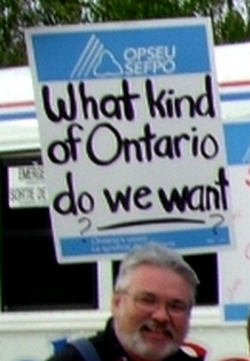 Playing this role of chumps
every four years (or two
years in a minority government situation) and entrusting our fate to a
government over whose agenda we have no control is not acceptable. It
does not lead to any solutions of problems. A new direction needs to be
set for Ontario in which resolving
the real problems facing the workers and people is put at the centre of
all politics. Nobody will do this for us. The workers and people of
Ontario have to put forward their own agenda, based on their own needs
and to work at holding governments to account for implementing it. Playing this role of chumps
every four years (or two
years in a minority government situation) and entrusting our fate to a
government over whose agenda we have no control is not acceptable. It
does not lead to any solutions of problems. A new direction needs to be
set for Ontario in which resolving
the real problems facing the workers and people is put at the centre of
all politics. Nobody will do this for us. The workers and people of
Ontario have to put forward their own agenda, based on their own needs
and to work at holding governments to account for implementing it.
While the politicians and the media of the rich did not
address the issues of concern to workers and people during the
election, Ontario Political Forum made a contribution to
breaking the silence on the workers' real working and living
conditions, demands and concerns and put them in
the context of the overall fight for rights and the need for a profound
renewal of the political arrangements. This work should continue with
the aim of involving Ontario workers and people in a discussion on how
to solve the urgent problems we face.

No Harper Hat-Trick in Greater Toronto Area
- Steve Rutchinski -
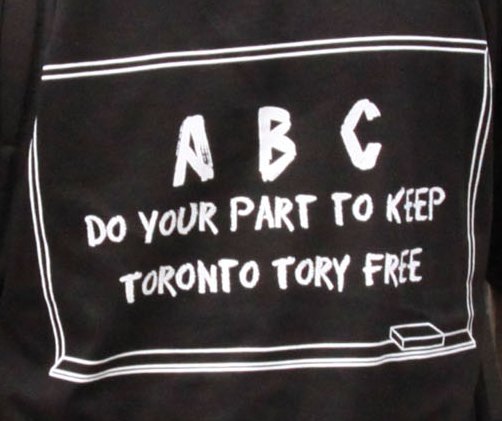
"Anything But
Conservative" campaign
of Toronto teachers.
|
Voters in the greater Toronto area (GTA) punctured some
of the arrogance of the Harper-Ford-Hudak triumvirate plan, that
together they would capture power provincially in Ontario and
"complete the hat-trick," as Harper put it. That was their election
objective for Ontario.
Their plan to capture power provincially was
not left to chance. The federal Conservatives' electoral machine, along
with Toronto Mayor Rob Ford, Conservative federal cabinet ministers and
Prime Minister
Stephen Harper were in action for a repeat of the Ford-Harper election
victories in the GTA.
In the lead up to the provincial election, at an August
2 backroom strategizing event hosted by Mayor Rob Ford, Prime Minister
Harper was caught on video saying: "We've started cleaning up
the left-wing mess federally [...] [Mayor] Rob [Ford] is doing
it municipally and now we've got to complete
the hat-trick and do it provincially as well."[1]
Municipally, in the six boroughs that make up the
amalgamated city of Toronto, Rob Ford had come to power having captured
65 per cent of the votes cast in Etobicoke, 57 per cent of the votes
cast in Scarborough, 53 per cent in North York, 48 per cent in York and
43 per cent in East York. Rob Ford's
"success" was credited for playing a role in helping the Conservatives
make headway in the GTA in the Federal 2011 election. The federal
Conservatives captured 18 new ridings in the GTA in the last election
and that is what gave Harper his majority.
So it is significant that the Harper-Ford-Hudak
triumvirate did not accomplish their mission. Had they been able to
deliver the 18 GTA electoral districts that gave Harper his majority
federally to the provincial Conservatives, Ontario would be looking at
a Hudak government today.
But they did not succeed. The Conservatives were
essentially shut out in the GTA and as a result -- no hat-trick for the
Harper-Hudak-Ford gang. McGuinty emerged from the election with a
minority, which gave rise to a huge sigh of relief across Toronto and
the GTA the morning after Election Day.
Yet with the next breath, came the realization that even with a
minority, the problem remains of holding government accountable to
fulfil its responsibility for the security and well-being of the
people.
As a result of
being in action, the workers and their allies in the GTA have had some
successes of late, making it difficult
for Ford to implement his agenda. Stopping a Harper hat-trick in
Ontario certainly helps. It creates space for the Workers' Opposition
to
organize, to mobilize for a pro-social alternative
and build an effective opposition.
Note
1.
http://www.youtube.com/watch?v=xo7TaBe3OAw

In Defence of Public Services
Beware the Commission on the Reform of
Ontario's Public
Services
 One of the main issues kept
hidden during the Ontario
election was the establishment by the McGuinty government of the
Commission on the Reform of Ontario's Public Services as part of the
Ontario budget at the end of March
2011. In the last days of the election, a
number of monopoly media pundits began
to say that whichever government was elected on October 6 would have to
proceed with a complete retrogressive overhaul of Ontario's public
services. One of the main issues kept
hidden during the Ontario
election was the establishment by the McGuinty government of the
Commission on the Reform of Ontario's Public Services as part of the
Ontario budget at the end of March
2011. In the last days of the election, a
number of monopoly media pundits began
to say that whichever government was elected on October 6 would have to
proceed with a complete retrogressive overhaul of Ontario's public
services.
It goes without saying such an "overhaul" would come at
the expense of the well-being of Ontarians. The budget gave the
Commission the mandate of helping to reduce the province's $16 billion
deficit. In this way, the myth of scarcity of resources is promoted
while public services and the workers
that provide them are denigrated as a cost to be reduced, not the means
by which the governments carry out their responsibility to ensure the
people's well-being. Using language that has now become familiar to the
people of Toronto under the administration of Mayor Rob Ford, Finance
Minister Dwight Duncan
told the Toronto Board of Trade on March 24 that the Commission would
look at the following issues: "Pursuing more value requires a change
from trying to do everything for everyone to focussing resources on
higher priority programs that directly impact front line services for
people. Separating core services from
something that would be nice to offer is especially important in an era
of limited resources. Government will have to find new ways of
delivering high quality public services. We will examine services and
whether the provincial government should continue to deliver a specific
program or if someone else can do
it better, more efficiently and in a manner that delivers better
results for people."
Ontario Political Forum is posting below
information on what is entailed in this reform of public services and
the work of the Commission, and calls on everyone to inform themselves
with the aim of joining the discussion on how to defend public services.
About the Commission on the
Reform of
Ontario's Public Services
"Don Drummond's Commission
could give political cover to
a government to swing the
axe while claiming to be simply following
through on independent recommendations..."
- National Post
In its March, 2011 Ontario Budget, the McGuinty
government announced a series of attacks on public sector workers and
the services they deliver. In the name of reducing the provincial
fiscal deficit it announced job cuts, $1.4 billion in program cuts and
measures to squeeze $200 million more out
of workers in government enterprises like the LCBO. Besides these
immediate measures, the budget also announced that a Commission on the
Reform of Ontario's Public Services had been established to carry out
an "independent review" of the entire broader public sector in Ontario
and to make changes to its operation
and funding, also with the aim of deficit reduction.
The broader public sector includes: provincial general
government; local general government; health and social service
institutions; universities, colleges, vocational and trades
institutions; local school boards; provincial business enterprises and
local government enterprises. The review announced in
the budget could affect the livelihoods of 1.1 million workers in this
sector and the services they deliver.
The Commission is being presented as an independent
expert review of the public sector. But reading between the lines of
Finance Minister Dwight Duncan's budget speech it can be seen that the
Commission's mandate is to clear the way for further privatization of
services now delivered by public
sector workers.
"Existing assumptions and traditional models must be
revisited and subjected to scrutiny and new approaches. Just because a
government department is delivering a program or service today does not
mean it should deliver that program or service in the future. The
Commission will examine long-term,
fundamental changes to the way government works. The Commission's work
will include exploring which areas of service delivery are core to the
Ontario government's mandate, which areas could be delivered more
efficiently by another entity and how to get better value for
taxpayers' money in the delivery of
public services."
Although McGuinty never talked about the Public Sector
Reform Commission during the recent Ontario election, there was a small
reference to it in the Liberal Party platform, which also shows that
this review is not "independent" but directed towards privatization of
public services.
"The Public Sector Reform Commission will examine
long-term, fundamental changes to the way government works, without
sacrificing health care or education, and without leading to higher
taxes. Our plan will build on the work of the Commission to continue to
reform public services, putting them on sustainable
footing for future generations of Ontarians... As we confront the
challenge of putting public services back on a sustainable track, we'll
look for partnerships with public sector groups, not-for-profit
organizations, and the private sector for new ideas."
The appointment of Don Drummond as the chair exposes
the intentions of the government in
establishing the Public Sector Reform Commission, now known as the
Drummond Commission. Drummond is a neo-liberal partisan, hardly an
"independent expert." He was Associate
Deputy Minister of Finance under Paul Martin in the Chrétien
government when it was making massive cuts to the civil service and
social programs. In a Globe and Mail interview he said his
biggest accomplishment was getting "the ball rolling on corporate
income tax cuts, which turned into an outright
revolution." Drummond left the upper levels of government through the
revolving door into the Toronto Dominion Bank, where he has become a
Senior Vice President. His job there was relations with governments and
public relations work promoting privatization of public services.
Drummond spent his last year at TD Bank developing and
promoting a plan for reorganizing Ontario's health care system. That
plan is published in a report Charting
a
Path
to
Sustainable
Health
Care in Ontario. Drummond's solution? Privatization.
"We urge the expansion of private sector involvement in
the provision of health care. As long as the public can use their OHIP
card, we believe they would probably support the underlying services
being provided in whatever manner is most efficient... The reality is
the private sector already plays an
important role in our health care system through the supply of
pharmaceuticals, home and long-term facilities, diagnostic equipment,
and various contract services. We challenge the government to open the
door more widely for private sector involvement, not only to improve
efficiencies, but also to capitalize on
the huge economic potential in building a vibrant health care sector in
Ontario."
The TD report also urges the Ontario government to
"recognize the enormous economic potential of the sector. Regardless of
government efforts to control costs going forward, health care is one
industry that is almost sure to expand over the long run. In the
context of Ontario, the high-value added
health care industry provides tremendous opportunities to diversify
Ontario's economic base and to fill some of the gap left over by a
structural decline in manufacturing."
Not only is the government's claim spurious that the
public
sector
review will be "independent," but so too is its claim about
"not
sacrificing education and health." Drummond can be counted on to target
health care, pushing the TD health care plan forward in the review.
Three other members have been appointed
to the Commission following Drummond's appointment. One of these is
Dominic Giroux who was the head negotiator for the Ministry of
Education in the last round of public school teacher negotiations. This
appointment suggests education will also be a target.

Toronto
Defeat Ford Administration's Agenda:
Defend the City
Workers!
- David Greig -
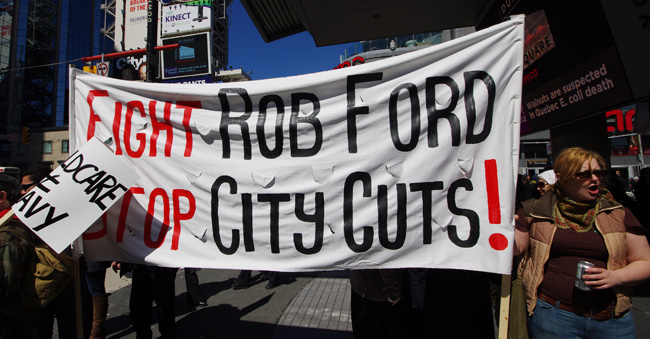 A
statement in brief of the City of Toronto administration's anti-social
agenda of city-wrecking on behalf of private monopoly interests
is that it aims to eliminate, privatize or sell off "anything that's
not nailed down." In spite of some set backs in its
implementation, due in large part to the growing resistance of the
people, this agenda remains in place, to be pursued by whatever
means possible. A
statement in brief of the City of Toronto administration's anti-social
agenda of city-wrecking on behalf of private monopoly interests
is that it aims to eliminate, privatize or sell off "anything that's
not nailed down." In spite of some set backs in its
implementation, due in large part to the growing resistance of the
people, this agenda remains in place, to be pursued by whatever
means possible.
To justify this agenda, the Ford regime cites alleged
waste and
corruption -- the "gravy" -- and a budget crisis, to which the regime
has both deliberately contributed and exaggerated. While these may
indeed exist, the regime has little to say about real waste and
corruption and instead has presented the city's public social programs
and services, and the pay, benefits, job security and the very
jobs of the workers who provide them as the "gravy" to be cut or
privatized. The most immediate human targets of the regime are clearly
the thousands of city workers.
Among other statements Mayor Rob Ford has made to this
effect, he said
in a radio interview this past summer, "In business the first
thing you look at is the labour. Your labour should be making up
maximum 20 per cent, not what we're at, 80 per cent, it's just unheard
of. So we're going to have to take a serious look at union and
non-union employees and looking at exactly what they're doing and
taking
it from there...." Not only is the 20 per cent figure a
decontextualized concoction for effect, but the "80 per cent" figure is
also false (a report to
the city executive committee put it at "nearly 48 per cent").
However, the aim is clear: degrade or destroy the livelihoods of
thousands of
city workers and the public services and social programs they
provide.
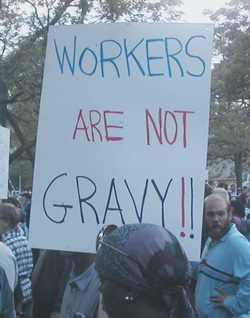 To
that end, the regime is already moving or has acted against cleaners in
Toronto Community Housing and police stations, and the
temporary employees to be displaced due to the planned garbage
privatization. Based on the threat of future layoffs, it also pressured
the workforce to accept a "voluntary" separation package and 700 of
1,100 applicants are now on this path, which will eliminate the
jobs they vacate. To
that end, the regime is already moving or has acted against cleaners in
Toronto Community Housing and police stations, and the
temporary employees to be displaced due to the planned garbage
privatization. Based on the threat of future layoffs, it also pressured
the workforce to accept a "voluntary" separation package and 700 of
1,100 applicants are now on this path, which will eliminate the
jobs they vacate.
Normal attrition being insufficient, the regime's
grandiose designs on
the jobs of thousands more city workers and the services they
provide still face the obstacle of the provisions in the workers'
collective agreements that require the city to redeploy them in the
event their work is contracted out or privatized. Such provisions stand
as a step toward fulfilling the guarantee of a livelihood and
well-being at a Canadian standard that belongs by right to all workers
as humans and creators of the social wealth and providers of
social services. One task facing society is to achieve such benefits
for all those workers to whom it is denied. The aim of the
anti-social warriors in power is, on the contrary, to destroy this
degree of security, the livelihoods and jobs that go with it, and
the standard it represents for all workers and in the "labour market."
The current collective agreements for about 20,000 city
workers
represented by CUPE Locals 416 and 79 end on December 31. Without
doubt, the regime's objective then will be to gut these contracts, in
particular their job security provisions, thereby clearing the
way to accelerated privatization, elimination of programs, services and
the jobs of those providing them.
The people of Toronto need to develop their resistance,
which has been
growing throughout 2011, and defeat the regime in power by
standing as one with the city workers. Their fight is the fight of all,
to turn back the anti-social offensive, its privatizations,
cuts and devastation. The struggle to defend and go on to expand public
services and programs, and for the rights and well-being of all
workers and the people necessarily means defending the workers who
provide public services and programs.

Housing Is a Right!
Oppose Decision to Sell-Off Social Housing!
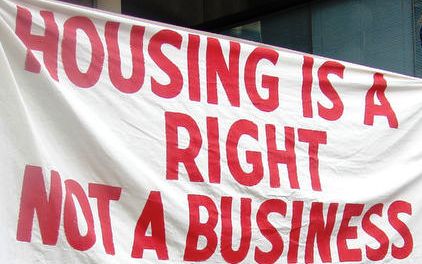 On Friday, October 22, the board of the
Toronto Community
Housing Corporation
(TCHC) voted to sell off 706 of its single-unit properties
that house as many as 2,600 people. City council and the provincial
government will also have a say in the decision. At the board meeting,
residents of Toronto Community
Housing shouted "Shame!" and "We are not for sale!" Their vocal
opposition was joined by their two representatives on the 13-member
board. On Friday, October 22, the board of the
Toronto Community
Housing Corporation
(TCHC) voted to sell off 706 of its single-unit properties
that house as many as 2,600 people. City council and the provincial
government will also have a say in the decision. At the board meeting,
residents of Toronto Community
Housing shouted "Shame!" and "We are not for sale!" Their vocal
opposition was joined by their two representatives on the 13-member
board.
The TCHC states its mission as follows: "Our mission is
to provide
affordable housing, connect tenants to services and opportunities, and
work together to build healthy communities." The action of the board to
divest itself of 706 units of affordable housing shows not only its
illegitimacy, but that of the
Ford regime which contrived it in the name of opposing corruption. The
board's decision must be opposed.
Most immediately, implementing the decision would
disrupt the lives
of those to be evicted from the homes in question. They would be
relocated to what are usually less adequate multi-unit buildings and
housing
projects. The loss of these units would also result in a
huge additional
delay
for
those who have already waited many years for a
TCHC unit. Already, the waiting list for TCHC housing is as long as 10
years, with many thousands of people on the list. And there is no
guarantee
that this sell-off would not be followed by more or even the
complete liquidation of the TCHC.
Selling off social housing would give obvious
opportunities to
real-estate
sales companies, speculators and developers. Likewise, landlords, which
are often not individuals but large businesses and closely tied to the
aforementioned interests, would be in a favourable situation to
increase rents on existing properties
because of a diminishing pool of affordable social housing. Moreover,
if public housing with rent geared to income is replaced by rent
subsidies, it will be a very concrete case of a government "paying the
rich," since the subsidies will cover not only the cost of housing but
also the profit demanded by the private
landlord. So, even more money would be required to provide just the
inadequate level of housing now available from the TCHC.
The TCHC was formed in 2002 when the province
downloaded its social
housing to the city and this was combined with existing municipal
social housing. It provides housing to about 164,000 people in various
houses, buildings and housing projects, almost all of whose rent is
geared to their income,
as a measure to mitigate situations where people must choose between
paying for housing versus other necessities of life.
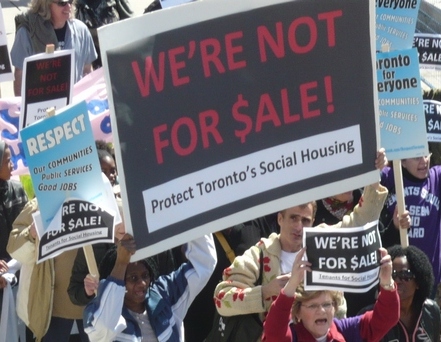 The critical situation of
the lack of affordable
housing in Toronto
is a feature of the anti-social offensive, where the high cost of
buying a home or even renting is exacerbated by widespread low incomes,
job insecurity and unemployment. Moreover, this inhuman situation
exists because of a refusal
by governments at all levels to recognize housing as a right and
to work to see that this basic human need is fulfilled. The critical situation of
the lack of affordable
housing in Toronto
is a feature of the anti-social offensive, where the high cost of
buying a home or even renting is exacerbated by widespread low incomes,
job insecurity and unemployment. Moreover, this inhuman situation
exists because of a refusal
by governments at all levels to recognize housing as a right and
to work to see that this basic human need is fulfilled.
At the municipal level, the Ford regime has made its
hallmark the
transfer of social wealth into private hands through various schemes of
privatization, cuts to services and contracting out. After taking power
at the end of 2010, it launched an attack on the TCHC under the pretext
of combatting corruption.
It replaced the previous TCHC board with a single hand-picked appointee
who in June made way for the present 13 member board controlled by
Mayor Ford's cabal. As the October 22 decision shows, these
machinations have now effectively left the residents of Toronto
Community Housing without a say in the
decisions which profoundly affect their lives. This is unacceptable.
Since early 2011, those in power have pushed the ideas
that the
city should not be in the home rental business, that social housing
should be replaced by rental subsidies paid to private landlords, and
that some units should be sold off to cover costs, such as paying for
repairs to other units. This was
often accompanied by talk that TCHC residents do not deserve to live in
single-unit housing, i.e., a regular house. The clear subtext to all
this is the profoundly retrograde notion of criminalizing the poor and
mobilizing other workers and middle strata against them. The TCHC board
has also launched a new attack
on their workers: the privatization of its custodial jobs.
The October 22 vote confirms
the anti-social course of the city
administration with respect to housing. The right to decent housing for
all is fundamental especially in a modern society and city like
Toronto. But in Canada and Toronto, as in much of the world dominated
by
the monopolies striving "to be competitive on the global market,"
the anti-social offensive is such that even the inadequate social
programs which presently exist are being attacked. Instead of acting to
use the available human and material resources, including the existing
housing stock, to address the need for housing, the city regime does
the opposite.
The course being pursued by the city administration and
its minions
at the TCHC must be halted, just as the other aspects of this
city-wrecking agenda affecting the majority of Toronto's residents be
they the city workers, other workers, youth, middle strata, the poor
and vulnerable must also be stopped
and the anti-human situation reversed. People must stand together to
accomplish this task.

Vigorous Opposition to Anti-Social Wrecking
at City Council
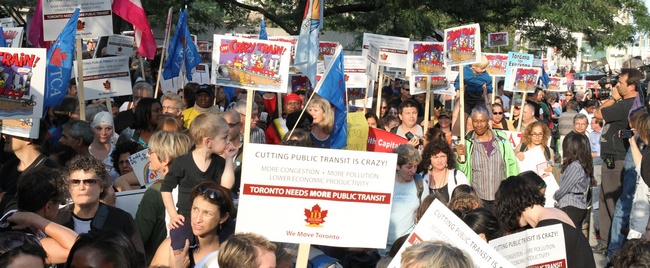 Rally at Toronto City
Hall, September 26, 2011.
Rally at Toronto City
Hall, September 26, 2011.
As the growing resistance to the
Toronto city government's anti-social offensive manifested itself in a
militant
8,000-strong demonstration on the evening of September 26, Toronto
City Council met to consider the regime's Core Service Review, User Fee
Policy and Voluntary Separation Program.
The first of these took up most of the session.
Regarding the Core Services Review, in the end, certain
cuts were approved, including the "Christmas Bureau" that provided
gifts to some impoverished children, the "Hardship Fund" that gave some
assistance to the poor for medical costs, certain community development
and environmental activities, among
others. Likewise, the Toronto Zoo and three theatres are to be sold off.
A few cuts were rejected, such as the sale of the
Parking
Authority. Proposed cuts to public libraries, child care and long term
care facilities and public transportation were not rejected and instead
deferred to the city manager and the year-end budget process. The
manoeuvre to defer was influenced by the growing
outrage of Toronto residents confronted with the reality of the
regime's agenda in the midst of the provincial election. The mayor and
his council supporters longed for the realization of the
Harper-Hudak-Ford
"hat-trick" promised by the prime minister in July, but realized that
their own agenda was mobilizing people
against their dream. These deferrals neither had the desired
effect nor did they signal any abandonment of the regime's cuts,
privatization and sell-off plans. The mayor continues to loudly assert
that residents who contact him demand he "stay the course" and his
intention is to do just that.
The lower profile but quite important User Fee Policy
was also approved. This form of taxation, which falls most heavily upon
those least able to pay means certain programs and services are to be
provided increasingly or even completely according to ability to pay,
rather than need.
The Voluntary Separation Program was likewise approved.
It is to see the elimination of some 700 city workers pressured to
apply under threat of later layoff as the wrecking agenda
proceeds. The city workers have been and continue to be the main target
of the city regime, who represent the very
rich and their monopolies.
Also looming in the
aftermath of September 26 and 27 is the
regime's ongoing order for a 10 per cent reduction to the budgets of
all city departments, the late October council consideration of bids
for the further privatization of garbage collection, and the "Service
Efficiency Studies." The latter item, which feeds into
the year-end budget process with no pretence of public consultation,
will generate the further proposals for privatization of city public
services and programs.
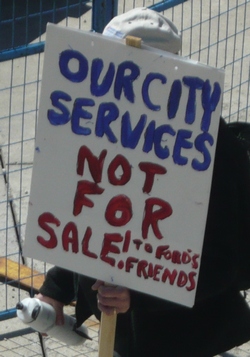 The regime continues to
point to a budget crisis as the
reason devastation of the public services is required. It always
presents the largest figures possible, deliberately inflated by its own
decisions (e.g., the cancellation of the vehicle registration
fee) and avoids providing an honest report. As the size of revenues
for 2011 come to light, from the Land Transfer tax for instance, it is
ever more obvious the budget hysteria is a dishonest pretext the regime
uses to drive the city-wrecking agenda. The regime continues to
point to a budget crisis as the
reason devastation of the public services is required. It always
presents the largest figures possible, deliberately inflated by its own
decisions (e.g., the cancellation of the vehicle registration
fee) and avoids providing an honest report. As the size of revenues
for 2011 come to light, from the Land Transfer tax for instance, it is
ever more obvious the budget hysteria is a dishonest pretext the regime
uses to drive the city-wrecking agenda.
The existing labour agreements for about 20,000 city
workers represented by CUPE 416 and 79 likewise end on December 31.
Since the workers themselves, their jobs and terms of employment are
the main target of
the regime, the embodiment of the multimillionaire mayor's self-serving
definition of "gravy," the fight of these
workers will be crucial to the developing resistance of the people of
Toronto to the anti-social offensive.

PREVIOUS
ISSUES | HOME
Read Ontario Political Forum
Website: www.cpcml.ca
Email: ontario@cpcml.ca
|


 The election for the
Ontario legislature has come and
gone without Ontario workers' real working and living conditions,
demands and concerns ever being addressed in a serious way by either
the ruling party in power once again or those which form the Official
Opposition. The monopoly media also maintained silence
about these real election issues.
The election for the
Ontario legislature has come and
gone without Ontario workers' real working and living conditions,
demands and concerns ever being addressed in a serious way by either
the ruling party in power once again or those which form the Official
Opposition. The monopoly media also maintained silence
about these real election issues.  Playing this role of chumps
every four years (or two
years in a minority government situation) and entrusting our fate to a
government over whose agenda we have no control is not acceptable. It
does not lead to any solutions of problems. A new direction needs to be
set for Ontario in which resolving
the real problems facing the workers and people is put at the centre of
all politics. Nobody will do this for us. The workers and people of
Ontario have to put forward their own agenda, based on their own needs
and to work at holding governments to account for implementing it.
Playing this role of chumps
every four years (or two
years in a minority government situation) and entrusting our fate to a
government over whose agenda we have no control is not acceptable. It
does not lead to any solutions of problems. A new direction needs to be
set for Ontario in which resolving
the real problems facing the workers and people is put at the centre of
all politics. Nobody will do this for us. The workers and people of
Ontario have to put forward their own agenda, based on their own needs
and to work at holding governments to account for implementing it. 
 One of the main issues kept
hidden during the Ontario
election was the establishment by the McGuinty government of the
Commission on the Reform of Ontario's Public Services as part of the
Ontario budget at the end of March
2011. In the last days of the election, a
number of monopoly media pundits began
to say that whichever government was elected on October 6 would have to
proceed with a complete retrogressive overhaul of Ontario's public
services.
One of the main issues kept
hidden during the Ontario
election was the establishment by the McGuinty government of the
Commission on the Reform of Ontario's Public Services as part of the
Ontario budget at the end of March
2011. In the last days of the election, a
number of monopoly media pundits began
to say that whichever government was elected on October 6 would have to
proceed with a complete retrogressive overhaul of Ontario's public
services.  A
statement in brief of the City of Toronto administration's anti-social
agenda of city-wrecking on behalf of private monopoly interests
is that it aims to eliminate, privatize or sell off "anything that's
not nailed down." In spite of some set backs in its
implementation, due in large part to the growing resistance of the
people, this agenda remains in place, to be pursued by whatever
means possible.
A
statement in brief of the City of Toronto administration's anti-social
agenda of city-wrecking on behalf of private monopoly interests
is that it aims to eliminate, privatize or sell off "anything that's
not nailed down." In spite of some set backs in its
implementation, due in large part to the growing resistance of the
people, this agenda remains in place, to be pursued by whatever
means possible. To
that end, the regime is already moving or has acted against cleaners in
Toronto Community Housing and police stations, and the
temporary employees to be displaced due to the planned garbage
privatization. Based on the threat of future layoffs, it also pressured
the workforce to accept a "voluntary" separation package and 700 of
1,100 applicants are now on this path, which will eliminate the
jobs they vacate.
To
that end, the regime is already moving or has acted against cleaners in
Toronto Community Housing and police stations, and the
temporary employees to be displaced due to the planned garbage
privatization. Based on the threat of future layoffs, it also pressured
the workforce to accept a "voluntary" separation package and 700 of
1,100 applicants are now on this path, which will eliminate the
jobs they vacate. On Friday, October 22, the board of the
Toronto Community
Housing Corporation
(TCHC) voted to sell off 706 of its single-unit properties
that house as many as 2,600 people. City council and the provincial
government will also have a say in the decision. At the board meeting,
residents of Toronto Community
Housing shouted "Shame!" and "We are not for sale!" Their vocal
opposition was joined by their two representatives on the 13-member
board.
On Friday, October 22, the board of the
Toronto Community
Housing Corporation
(TCHC) voted to sell off 706 of its single-unit properties
that house as many as 2,600 people. City council and the provincial
government will also have a say in the decision. At the board meeting,
residents of Toronto Community
Housing shouted "Shame!" and "We are not for sale!" Their vocal
opposition was joined by their two representatives on the 13-member
board.  The critical situation of
the lack of affordable
housing in Toronto
is a feature of the anti-social offensive, where the high cost of
buying a home or even renting is exacerbated by widespread low incomes,
job insecurity and unemployment. Moreover, this inhuman situation
exists because of a refusal
by governments at all levels to recognize housing as a right and
to work to see that this basic human need is fulfilled.
The critical situation of
the lack of affordable
housing in Toronto
is a feature of the anti-social offensive, where the high cost of
buying a home or even renting is exacerbated by widespread low incomes,
job insecurity and unemployment. Moreover, this inhuman situation
exists because of a refusal
by governments at all levels to recognize housing as a right and
to work to see that this basic human need is fulfilled.
 The regime continues to
point to a budget crisis as the
reason devastation of the public services is required. It always
presents the largest figures possible, deliberately inflated by its own
decisions (e.g., the cancellation of the vehicle registration
fee) and avoids providing an honest report. As the size of revenues
for 2011 come to light, from the Land Transfer tax for instance, it is
ever more obvious the budget hysteria is a dishonest pretext the regime
uses to drive the city-wrecking agenda.
The regime continues to
point to a budget crisis as the
reason devastation of the public services is required. It always
presents the largest figures possible, deliberately inflated by its own
decisions (e.g., the cancellation of the vehicle registration
fee) and avoids providing an honest report. As the size of revenues
for 2011 come to light, from the Land Transfer tax for instance, it is
ever more obvious the budget hysteria is a dishonest pretext the regime
uses to drive the city-wrecking agenda.